Jallikattu
Jallikattu (or sallikkattu), also known as eru thazhuvuthal and mañcuvirattu[2], is a traditional event in which a bull (Bos indicus), such as the Pulikulam[3] or Kangayam breeds,[4] is released into a crowd of people, and multiple human participants attempt to grab the large hump on the bull's back with both arms and hang on to it while the bull attempts to escape. Participants hold the hump for as long as possible, attempting to bring the bull to a stop. In some cases, participants must ride long enough to remove flags on the bull's horns.[5][6]
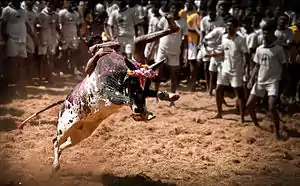 A youth trying to take control of a bull in jallikattu at Alanganallur. | |
| Highest governing body | Tamil Nadu Jallikattu Federation Local organising committees |
|---|---|
| Nicknames | Sallikkattu; eru thazhuvuthal; manju virattu |
| First played | 400–100 BC[1] |
| Characteristics | |
| Contact | Yes |
| Team members | No teams, single competitors |
| Mixed gender | No |
| Type | Traditional sport |
| Venue | Open ground |
| Presence | |
| Country or region | Tamil Nadu, India |
| Olympic | No |
| Paralympic | No |
Jallikattu is typically practised in the Indian state of Tamil Nadu as a part of Pongal celebrations on Mattu Pongal day, which occurs annually in January.
As there were incidents of injury and death associated with the sport, both to the participants and to the animals forced into it, animal rights organizations have called for a ban to the sport, resulting in the court banning it several times over the past years. However, with protest from the people against the ban, a new ordinance was made in 2017 to continue the sport.[7]
Etymology
Ancient Tamil Sangams described the practice as yeru thazhuvuthal (Tamil: ஏறு தழுவுதல்), literally 'bull embracing'.[8] The modern term jallikattu (ஜல்லிக்கட்டு) or sallikattu (சல்லிக்கட்டு) is derived from salli ('coins') and kattu ('package'), which refers to a prize of coins that are tied to the bull's horns and that participants attempt to retrieve.[9] Manju virattu (மஞ்சு விரட்டு) literally means 'bull chasing'.
History
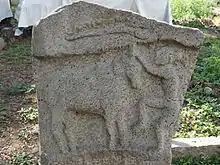
Jallikattu has been known to be practiced during the Tamil classical period (400-100 BCE).[1][10] It was common among the Ayar people who lived in the ‘Mullai’ geographical division of the ancient Tamizh Nadu.[8][11] Later, it became a platform for display of bravery, and prize money was introduced for participation encouragement. A seal from the Indus Valley Civilization depicting the practice is preserved in the National Museum, New Delhi.[12] A cave painting in white kaolin discovered near Madurai depicting a lone man trying to control a bull is estimated to be about 1,500 years old.[13]
Variants and rules
| Part of a series on |
| Animal rights |
|---|
|
Ideas |
|
Related |
|
|

Some variants include:[14]
- Vadi manjuviraṭṭu: This is the most common category of jallikattu. The bull is released from a closed space (vadi vasal) and the contestants attempt to wrap their arms or hands around the hump of the bull and hold on to it to win the award. Only one person is allowed to attempt at a time. This variant is most common in the districts of Madurai, Theni, Thanjavur, and Salem.
- Vēli viraṭṭu: In this variant the approach is slightly different as the bull is directly released into open ground. The rules are the same as that of vadi majuviraṭṭu. This is a popular variant in the districts of Sivagangai and Madurai.
- Vaṭam manjuviraṭṭu: In this variant, the bull is tied with a 15 m (49 ft) rope (vatam means 'circle' in Tamil). There are no other physical restrictions for the bull and hence it can move freely anywhere. The maximum time period given is 30 minutes. A team of seven to nine members can attempt to untie the gift token that is tied on the bull's horn.
Bulls enter the competition area through a gate called the vadi vasal. Typically, participants must only hold onto the bull's hump. In some variations, they are disqualified if they hold onto the bull's neck, horns or tail. There may be several goals to the game depending on the region. In some versions, contestants must either hold the bulls hump for 30 seconds or for 15 metres (49 ft).[15] If the contestant is thrown by the bull or falls, they lose. Some variations only allow for one contestant. If two people grab the hump, then neither person wins.[16]
Breeding
Bos indicus bulls are bred specifically by people of the village for the event. Bulls that are able to participate successfully in the jallikattu event are used as studs for breeding. These bulls also fetch higher prices in the markets.[17]
Training and preparation
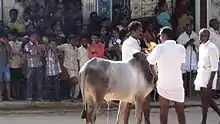
Preparation
With the introduction of the Regulation of Jallikattu Act, 2009,[18] by the Tamil Nadu legislature, the following activities were done in preparation of the event:
- A written permission is obtained from the respective collector, thirty days prior to conduct of event along with notification of the event location.
- The arena and the way through which the bulls pass through is double-barricaded, in order to avoid injuries to the spectators and by-standers who may be permitted to remain within the barricades.
- The necessary gallery areas are built up along the double barricades.
- The necessary permissions are obtained from the collector for the participants and the bulls fifteen days prior.
- Final preparation before the event include a complete testing by the authorities of the Animal Husbandry Department, to ensure that performance enhancement drugs, liquor or other irritants are not used on the bulls.
Animal welfare concerns
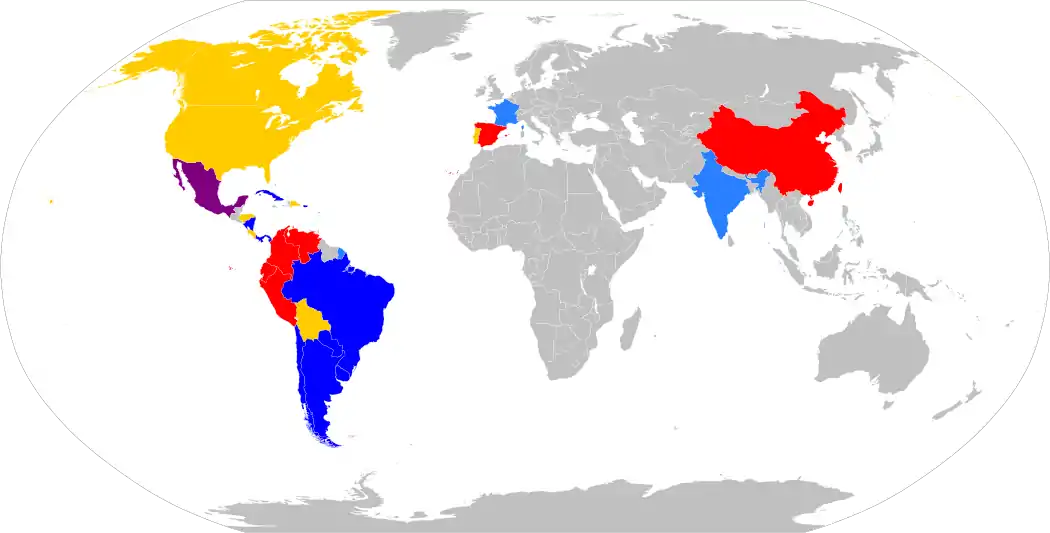
| | Nationwide ban on bullfighting | | Nationwide ban on bullfighting, but some designated local traditions exempted |
| | Some subnational bans on bullfighting | | Bullfighting without killing bulls in the ring legal (Portuguese style or 'bloodless') |
| | Bullfighting with killing bulls in the ring legal (Spanish style) | | No data |
Between 2008 and 2014, 43 humans and 4 bulls were killed in the jallikattu events. In 2017, there were 23 deaths in addition to about 2,500 human injuries and several instances of injury to the bulls.[19] 2020 saw 5 deaths from participation in the event.[20]
Animal welfare concerns are related to the handling of the bulls before they are released and also during competitor's attempts to subdue the bull. Practices before the bull is released include prodding the bull with sharp sticks or scythes, extreme bending of the tail which can fracture the vertebrae, and biting of the bull's tail. There are also reports of the bulls being forced to drink alcohol to disorient them, or chilli peppers being rubbed in their eyes to aggravate the bull.[21]
During attempts to subdue the bull, they are stabbed by various implements such as knives or sticks, punched, jumped on and dragged to the ground. In variants in which the bull is not enclosed, they may run into traffic or other dangerous places, sometimes resulting in broken bones or death.[22][23] Protestors claim that jallikattu is promoted as bull taming, however, others suggest it exploits the bull's natural nervousness as prey animals by deliberately placing them in a terrifying situation in which they are forced to run away from the competitors which they perceive as predators and the practice effectively involves catching a terrified animal.[24] Along with human injuries and fatalities, bulls themselves sometimes sustain injuries or die, which people may interpret as a bad omen for the village.
An investigation by the Animal Welfare Board of India concluded that "jallikattu is inherently cruel to animals".[25][26]
Animal welfare organisations such as the Federation of Indian Animal Protection Organisations (FIAPO)[27] and PETA India have protested against the practice.[28][29] The Indian Minister of Women and Child Development Maneka Gandhi denied the claim by Jallikattu aficionados that the sport is only to demonstrate the "Tamil love for the bull", citing that the Tirukkural does not sanction cruelty to animals.[30]
Ban, protests and authorization
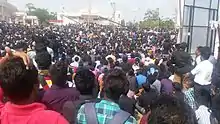
The Animal Welfare Board of India filed a case in the Supreme Court of India for an outright ban on jallikattu because of the cruelty to animals and the threat to public safety involved.
On 27 November 2010, the Supreme Court permitted the Government of Tamil Nadu to allow jallikattu for five months in a year and directed the District Collectors to make sure that the animals that participate in jallikattu are registered to the Animal Welfare Board and in return the Board would send its representative to monitor the event.[31] The Government of Tamil Nadu ordered that ₹2 lakh (US$2,800) be deposited by the organizers in case of an accident or injury during the event and enacted a rule to allow a team of veterinarians be present at the venue for certifying the bulls for participation in the event and to provide treatment for bulls that get injured.[31]
The Ministry of Environment and Forests issued a notification in 2011 that banned the use of bulls as performing animals, thereby banning the event[32][33] But the practice continued to be held under Tamil Nadu Regulation of Jallikattu Act No 27 of 2009.[34] On 7 May 2014, the Supreme Court of India struck down the State law and banned jallikattu altogether.[33][35] The Supreme Court noted that any flouting of the ban should result in penalties for cruelty to animals under The Prevention of Cruelty to Animals Act, 1960.[32][36] The court also asked the Government of India to amend the law on preventing cruelty to animals to bring bulls within its ambit. The Supreme Court also ruled that cruelty is inherent in these events, as bulls are not anatomically suited for such activities and making them participate is subjecting them to unnecessary pain and suffering, so such events were outlawed.[37][38]
On 8 January 2016, the Ministry of Environment and Forests permitted the continuation of the tradition under certain conditions, effectively ending the ban.[39][40][41] However, on 14 January 2016, the Supreme Court of India issued a stay on this order, upholding the ban, after a petition filed by the Animal Welfare Board of India and PETA India, leading to protests all over Tamil Nadu.[42] The Supreme Court refused to review its decision on 26 July 2016.[43]
On 16 January 2016, the World Youth Organization (WYO) protested at Chennai against the stay on the order overturning ban on conducting jallikattu in Tamil Nadu. The WYO also demanded a ban on PETA in India.[44][45]
On 8 January 2017, several hundreds of protesters conducted a rally at Chennai Marina opposing the ban on jallikattu.[46] The participants walked from the lighthouse to the labour statue bearing posters saying "save jallikattu".[47][48] A few churches openly conducted prayer mass and rally against the Supreme Court ruling.[49] Following the protests at Chennai, many students started rallies in various towns of Tamil Nadu.[7]
After hearing the petitions which were led by the Animal Welfare Board of India challenging central government's notification,[50] the Supreme Court of India on 12 January ordered a stay, issued notices to the central government and the Tamil Nadu government[51][52][53] and later refused to lift the stay.[54] Numerous jallikattu events were held across Tamil Nadu in protest of the ban,[55] and hundreds of participants were detained by police in response.[56][57] The Supreme Court has agreed to delay its verdict on jallikattu for a week following the centre's request that doing so would avoid unrest.
Due to these protests, on 21 January 2017, the governor of Tamil Nadu issued a new ordinance that authorized the continuation of jallikattu events.[58] On 23 January 2017 the Tamil Nadu legislature passed a bipartisan bill, with the accession of the Prime Minister, exempting jallikattu from the Prevention of Cruelity to Animals Act (1960).[59][60] The first legal jallikattu under this exemption took place on 1 February in Alanganallur, Madurai district.[61]
The legal situation surrounding jallikattu is as yet not clearly resolved. Some, such as ex Ministry of External Affairs cabinet minister Salman Khurshid, have stated that the matter will only be truly resolved if the Prevention of Cruelty to Animals Act is amended as local ordinances and state laws cannot trump Indian federal law.[62] According to The Hindu, many other Indian legal experts agreed with Khurshid's view, as federal laws such as the PCA are always more powerful than state laws, and in that respect the Prevention of Cruelty to Animals (Tamil Nadu Amendment) Act of 2017 is not much different from the state law overturned in 2009.[63] For its part, PETA India has said that it will "study" the new ordinance, and has not ruled out a challenge to the new law on the same grounds as it challenged the 2009 law.[64] On Jan 25, the Animal Welfare Board of India (AWBI) started the legal process towards another ban by formally challenging the new law before the Supreme Court,[63][65] but they withdrew the petition on Jan 26.[66] According to the AWBI's acting chairperson, AWBI does not plan to re-file the petition, but he claimed no knowledge of what other organizations, such as PETA, may do.[66]
Timeline of the legal battle against the performance
- 29 March 2006: While hearing a petition filed by K. Muniasamy Thevar seeking permission to conduct a bullock cart race, the Madras High Court's Madurai Bench bans the sport of jallikattu.
- 10 January 2007: Jallikattu organisers file an appeal and the Single Bench Order is stayed by a Division Bench, paving the way to conduct the event again.
- 9 March 2007: The Division Bench sets aside Single Bench Order and gives suggestions to the State to introduce a regulatory mechanism.
- 27 July 2007: The Madras High Court's order is stayed by the Supreme Court after hearing an appeal by AWBI.
- 11 January 2008: The Supreme Court vacates stay, refusing to allow the sport.
- 15 January 2008: The Supreme Court allows a revision petition of the State, thereby permitting the event.
- 21 July 2009: The ruling DMK government passes the Tamil Nadu Regulation of Jallikattu Act, 2009.
- 8 April 2011: The Tamil Nadu Regulation of Jallikattu Act, 2009 is challenged by PETA before the Supreme Court.
- 11 July 2011: Ministry of Environment and Forests issues notification banning the use of bulls as performing animals.
- 7 May 2014: The Supreme Court bans jallikattu and strikes down the State law on the basis of a plea by the AWBI and PETA.
- 7 January 2016: Ministry of Environment and Forests modifies its earlier notification to permit the sport.
- 12 January 2016: The Supreme Court stays the Centre's notification after hearing pleas by the AWBI and PETA.
- 16 November 2016: The State government's review petition seeking permission to conduct the event in 2017 is dismissed by the Supreme Court.
- 12 January 2017: The Supreme Court refuses to give a hurried judgement on a government notification to accommodate the sport in 2017.
- 21 January 2017: The Centre clears the ordinance proposed by the AIADMK government to bring a State amendment to the Prevention of Cruelty to Animals Act, 1960. The State had earlier urged the Centre to consider the plea following massive protests.
- 23 January 2017: The State passes the Jallikattu Bill bringing into effect the Preventionof Cruelty to Animals (Tamil Nadu Amendment) Act, 2017, thereby allowing the conduct of jallikattu.
- 24 January 2017: The AWBI and PETA challenges the Tamil Nadu Amendment Act, 2017.
- 31 January 2017: The Supreme Court refuses to stay the Tamil Nadu Amendment Act, 2017.
- 6 November 2017: The Supreme Court seeks the State government's response to the plea filed by PETA questioning the Amendment Act.
- 2 February 2018: The Supreme Court refers all petitions filed against the sport to a Constitution Bench.[67]
Jallikattu Premier League
The Jallikattu Premier League is a professional league in Tamil Nadu for jallikattu. The league was announced on 24 February 2018, to be organized in Chennai by the Tamil Nadu Jallikattu Peravai and the Chennai Jallikattu Amaippu.[68][69]
In popular culture
Jallikattu is often shown in Tamil cinema where the hero tames the bull to prove his gallantry.[70] Some of the popular movies include:
- Aravaan[71]
- Cheran Pandiyan
- Ilami[72]
- Kanni Paruvathile
- Mann Vasanai
- Mirugam - The movie was released after cutting the jallikattu scene due to objections by the Censor Board[73][74]
- Murattu Kaalai[70]
- Rajakumaran
- Thaikku pin Tharam
- Vilaiyaattu Pillai[75]
- Virumaandi[70]
Popular cinema, an integral part of the modern social and political life of Tamil Nadu, has often portrayed jallikattu as a symbol of masculinity and social status. There are instances of the portrayal running as a counter-narrative, wherein a young hero tames an overlord's bull and turns it into a challenge to power and authority.[76] In films such as Cheran Pandian, Rajakumaran, and Murattukaalai, the conflict between the hero and the villain is portrayed through jallikattu, during which the owner whose bull loses shoots the bull.[77] In Mannvasanai, the heroine's father declares that whoever tames the bull is eligible to marry his daughter, but kills the animal and commits suicide after an outsider from a nearby village tames it and lays claim to his daughter as the prize.[76] In Virumaandi the hero who returns from Singapore tames the bull, which means that his masculinity and traditional roots are intact, despite going to a foreign land.[76] In Thaiku pin Tharam, jallikattu is built into the film's climax, and it helps the hero prove he is worthy enough to win the girl.[78]
See also
| Wikimedia Commons has media related to Jallikattu. |
References
- François Gautier (2001). A Western Journalist on India: The Ferengi's Columns. ISBN 9788124107959.
- Ramakrishnan, T. "Governor clears ordinance on 'jallikattu'". The Hindu. Retrieved 26 February 2017.
- Valerie Porter; Lawrence Alderson; Stephen J.G. Hall; D. Phillip Sponenberg (9 March 2016). Mason's World Encyclopedia of Livestock Breeds and Breeding, 2 Volume Pack. CAB International. p. 275. ISBN 9781845934668.
- Ramesh, C.; Mariayyah, P.; Senthilkumar, A.; Rajendran, K. (2014). "A Study of Sports and Recreational Activities of Pura Village People and their Attitude Towards these Activities". Journal of Recent Research and Applied Studies. 1 (7): 89–94.
- Anugula, Himakiran. "Banning Jallikattu Will Decimate India's Indigenous Cattle Breeds – The Wire". Retrieved 17 January 2017.
- "What is Jallikattu? - This 2,000-year-old sport is making news in India. Here's why – The Economic Times". Retrieved 17 January 2017.
- Safi, Michael (23 January 2017). "Tamil Nadu passes order to lift bull-taming ban after angry protests". The Guardian. ISSN 0261-3077. Retrieved 26 March 2020.
- "Buzzing with bull talk". The Hindu. 8 January 2014. Retrieved 8 January 2014.
- "Politics of Pongal: Outrage over Jallikattu but not over drought in Tamil Nadu". 14 January 2017.
- Grushkin, Daniel (22 March 2007). "Fearless Boys with Bulls in Avaniapuram". The New York Times. Retrieved 9 July 2008.
The ritual dates back as far as 2,000 years...
- "Who said bullfighting is cruel?". Firstpost. 12 January 2012.
- T. Subramaniam (13 January 2008). "Bull-baiting of yore". The Hindu. Retrieved 12 January 2017.
- "Bull chasing, an ancient Tamil tradition". The Hindu. Retrieved 13 January 2013.
- "An ancient tradition sport". The Hindu. Archived from the original on 26 June 2014. Retrieved 13 January 2013.
- "'Bulls cannot be hurt' is the golden rule of Jallikattu, but who follows it?". asianetnews.tv. Retrieved 16 March 2018.
- "Jallikattu: What are the rules of the game". Outlook. Retrieved 20 January 2017.
- Natarajan, Swaminathan (19 July 2016). "Jallikattu: Why India bullfighting ban 'threatens native breeds'". BBC News. Retrieved 17 January 2017.
- "Laws of India: The Tamil Nadu Regulation of Jallikattu Act, 2009". www.lawsofindia.org. Retrieved 20 January 2017.
- "23 died in jallikattu in last one year". The Hindu. Chennai: Kasturi & Sons. 8 February 2018. Retrieved 11 February 2018.
- Pioneer, The. "5 die still Jallikattu all the rage in TN". The Pioneer. Retrieved 26 March 2020.
- Ray, A. (19 January 2017). "Jallikattu cheat sheet: 10 things you should know about the bull-taming sport". Economic Times. Retrieved 23 January 2017.
- Natarajan, S. (19 July 2016). "Jallikattu: Why India bullfighting ban 'threatens native breeds'". BBC News. Retrieved 20 January 2017.
- Mogul, P. (12 January 2016). "Jallikattu debate: Animal rights experts expose 'cruelty' of Indian bullfighting tradition". International Business Times. Retrieved 3 February 2017.
- "Jallikattu Ban: 'Send Them to the Butchers' is now the only option". The Quint. Retrieved 11 January 2017.
- Maulekhi, G. (13 January 2017). "Jallikattu: Bull taming is cruelty at its best, TN parties using it for political gains". FirstPost. Retrieved 25 January 2017.
- Rajagopol, Krishnadas (22 September 2016). "SC to hear Animal Welfare Board's petition challenging jallikattu order". The Hindu.
- "Save the bulls, support the ban". FIAPO. Archived from the original on 17 January 2017. Retrieved 15 January 2016.
- PTI. "PETA: Jallikattu stay 'partial victory' for bulls". The Hindu. Retrieved 26 February 2017.
- "PETA founder held in India over bullfight protest". Reuters. Retrieved 8 January 2016.
- Gandhi, Maneka Sanjay (27 March 2017). "Thirukkural does not sanction cruelty to animals". New Delhi Times. New Delhi: The Times Group. Retrieved 14 January 2021.
- "1 killed in Jalikattu". sify.com. 16 January 2011.
- "Animal Welfare Board of India vs. Nagaraja" (PDF). 7 May 2014.
- "SC bans Jalikattu". PETA. Retrieved 8 January 2016.
- "Tamil Nadu Regulation of Jallikattu Act" (PDF). The Wire. 21 July 2009.
- J.Venkatesan (8 May 2014). "Supreme Court bans Jallikattu in Tamil Nadu". The Hindu.
- "SC bans Jallikattu bull fights in-Tamil-Nadu". The Times of India. Retrieved 7 May 2014.
- "'Jallikattu is an abuse, not a sport': SC to hear pleas against Centre notification lifting ban on Jallikattu". First Post. 12 January 2016.
- "Jallikattu: Red Rag For the Law". The Citizen. 14 January 2016.
- "Centre lifts ban". The Indian Express. 8 January 2016.
- "Ministry of Environment and Forest allows use of bulls in Jallikattu in Tamil Nadu". One Law Street. 7 January 2016.
- "Centre allows Jalikattu". The Hindu. 8 January 2016.
- "Supreme Court refuses to vacate stay on Jallikattu order". The Hindu. 13 January 2016.
- "Supreme Court turns down plea to allow bull-taming sport Jallikattu before Pongal – Times of India". Retrieved 17 January 2017.
- "PETA Should be Banned in India : World Youth Organization – Thanthi TV". yarloosai.com. 16 January 2016. Retrieved 6 June 2016.
- "World Youth Organization demands ban on PETA in India". The News Minute. 16 January 2016. Retrieved 16 January 2016.
- "Jallikattu: Supporters organise rally in Chennai for seeking permission to hold bull-taming sport". Firstpost. 8 January 2017. Retrieved 11 January 2017.
- Staff Reporter. "Thousands hit the streets for jallikattu". The Hindu. Retrieved 11 January 2017.
- Hindu, The (18 January 2017). "Protest on Marina brings traffic to a standstill". The Hindu. Retrieved 19 January 2017.
- Hindu, The (12 January 2017). "Protests, rallies for jallikattu". Staff Reporter. The Hindu. Retrieved 19 January 2017.
- "SC to hear AWBI's petition challenging jallikattu order". The Hindu. 11 January 2016.
- "Supreme Court stays bull taming game Jallikattu; Jaya asks PM for an ordinance [Read Order]". One Law Street. 12 January 2016.
- "No Jallikattu in Tamil Nadu this year". The Hindu. 12 January 2016.
- "Jallikattu on hold: SC stays govt notification to allow bull taming". Hindustan Times. 12 January 2016.
- "Supreme Court refuses to vacate stay on jallikattu order". The Hindu. 13 January 2016.
- "Thousands Protest Across Tamil Nadu In Support Of Jallikattu". NDTV.com. Retrieved 21 November 2020.
- "Jallikattu ban: Over 500 detained for protesting SC ban in Tamil Nadu's Alanganallur". 17 January 2017. Retrieved 18 January 2017.
- "Jallikattu ban: 200 held in Madurai as protests continue across Tamil Nadu". 17 January 2017. Retrieved 17 January 2017.
- Mariappan, Julie (21 January 2017). "Tamil Nadu Governor signs ordinance for jallikattu". The Times of India. Archived from the original on 24 January 2017.
- Jesudasan, Dennis S. "Tamil Nadu to take ordinance route for conducting Jallikattu". The Hindu. Retrieved 26 February 2017.
- Sivakumar, B. (23 January 2017). "Jallikattu: Tamil Nadu assembly passes bill to amend PCA Act". The Times of India. Archived from the original on 24 January 2017.
- "Jallikattu legalised in Tamil Nadu: State Assembly passes bill without any opposition". FirstPost. 23 January 2017. Retrieved 24 January 2017.
- "Jallikattu Row: Matter could still go to Supreme Court and we could get adverse decision, says Salman Khurshid". The Financial Express. 21 January 2017. Retrieved 21 January 2017.
- "Jallikattu protesters demand permanent solution". The Hindu Business Line. 22 January 2017. Retrieved 25 January 2017.
- "Jallikattu reflects poorly on India: PETA India CEO after 'bullying'". The Hindustan Times. 23 January 2017. Retrieved 25 January 2017.
- "Jallikattu challenged again in Supreme Court by animal rights body". The New Indian Express. 25 January 2017. Retrieved 27 January 2017.
- "AWBI to withdraw plea against TN Jallikattu law". News Today. 26 January 2017. Archived from the original on 26 January 2017. Retrieved 28 January 2017.
- B. Tilak Chandar, S. Annamalai (20 January 2019). "Scarred yet untamed". The Hindu. Chennai: Kasturi & Sons. Retrieved 3 February 2019.
- "Get ready. Jallikattu Premier League in Chennai from January 7". India Today. 15 December 2017. Retrieved 16 March 2018.
- "Jallikattu Premier League To Start In Chennai From January 7". deccanchronicle.com. 15 December 2017. Retrieved 16 March 2018.
- "Rajni, Kamal did it". Behindwoods. Retrieved 8 January 2016.
- "5 best jallikattu scenes from Tamil films, from Murattu Kaalai to Virumaandi".
- "Taming of the bull: Jallikattu occupies a prominent place in Tamil cinema".
- "Mirugam movie". Behindwoods. Retrieved 8 January 2016.
- "Five films that showed Jallikattu extensively".
- "Catching a sport by its horns".
- "In films, jallikattu showcases masculinity".
- "Jallikattu: Power play by caste bigwigs in villages".
- "How films have influenced Tamil Nadu to embrace Jallikattu".